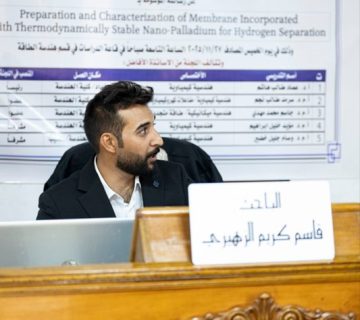The College of Engineering, University of Baghdad, hosted the public defence of the master’s thesis of Sara Mohammed Ayad, from the Department of Water Resources Engineering, entitled:
“An Intelligent Technique for Assessing Water Quality of the Tigris River.”
The defence took place on Wednesday, 3 September 2025, at the Dijla Hall in the Department of Water Resources Engineering, under the supervision of Asst. Prof. Dr. Ali Omran Muhsin.
The thesis addressed the issue of water pollution, which has become a major environmental challenge as a result of urbanisation, industrial expansion, and human activities. These factors have significantly affected the taste, colour, and odour of water, reducing its suitability for drinking, irrigation, and other uses.
To tackle this problem, the researcher employed the Water Quality Index (WQI) in combination with advanced computational techniques, including Artificial Neural Networks (ANN) and the Gravitational Search Algorithm (GSA), with the aim of improving prediction accuracy and supporting more effective water resources management.
The findings revealed that urban water bodies are the most vulnerable to pollution caused by human activities, underscoring the need for reliable and precise assessment methods. The proposed intelligent technique represents a promising step towards monitoring and improving the quality of water in the Tigris River, with significant potential for application in environmental protection and water resources sustainability.
The thesis aimed to:
- Develop a predictive model for the Water Quality Index of the Tigris River using the Gravitational Search Algorithm (GSA).
- Develop a predictive model for the Water Quality Index using Artificial Neural Networks (ANN).
- Assess the suitability of water for drinking and irrigation along the Tigris River within Iraq.
Based on these objectives, the thesis offered several recommendations, including:
- Expanding and continuously updating datasets to increase model accuracy while accounting for seasonal and temporal variations.
- Adopting hybrid models (GSA + ANN) to leverage the combined strengths of artificial intelligence and optimisation techniques.
- Extending the application to other regions within or outside Iraq with similar environmental conditions.
Following the scientific discussion, the evaluation of the thesis, and the candidate’s defence, the committee awarded the researcher the degree of Master of Science in Water Resources Engineering.







